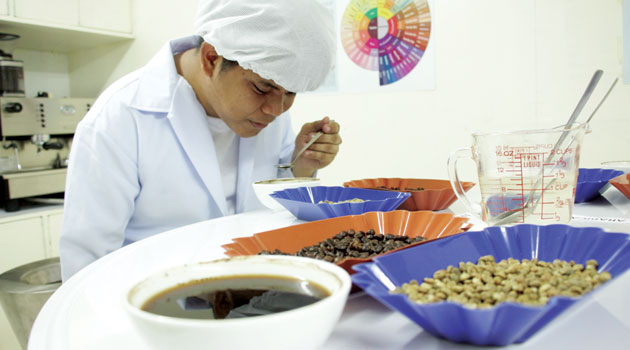The Philippines is blossoming with business potential, and the world is undoubtedly taking notice. That’s why Pierre Cote decided to enter an industry in the country that is already native to the land, but not being optimized – the coffee industry.
Thus was born Rocky Mountain Cafe, a local firm that not just deals with the production and commercialization of high- quality homegrown coffee, but also supports the livelihood of the local and indigenous people in areas where coffee can thrive.
Its aim is to be the largest coffee exporter in the Philippines, fully involved in the process from planting, producing, processing, packaging, and exporting coffee.
While the goal and dream are definitely audacious, Rocky Mountain Cafe is optimistic, as it is rooted in a business model that integrates itself not only within the business process, but also involves all stakeholders such as the local government units and the local farmers it deals with.
On the government side, the company closely works with the Department of Environment and Natural Resources to make sure that it does not adversely affect the land, the National Commission on Indigenous People to respect the rights of indigenous people, and the Department of Agriculture to optimize of the use of ancestral lands for the development of high value crops that generate higher income for the local farmers.
Rocky Mountain also works with local government units to determine how it can best contribute to local development.
Noel Colte, one of Rocky Mountain’s farmer-beneficiaries notes one of the most significant contributions of RMC to the farmers.
“They helped us convince the local government to build a farm-to-market road that bridges our coffee farms to the markets,” he said.
By producing and exporting coffee, Rocky Mountain supports the livelihood of the local and indigenous people
However, this is just one small aspect of one of the most extensive and holistic inclusive business models that can be found in the Philippines. Rocky Mountain’s model does not simply focus on it being a sustainable business for itself, but for the local people; it is centered on being involved in uplifting the lives and livelihoods of the local farmers.
When Rocky Mountain engages and operates a farmland (note that the company does not own the land; it only has land access to it for 25 years, but the seeds, trees, and fruits planted on the land are owned by Rocky Mountain for the agreed duration), it simultaneously runs a parallel farm that is wholly owned and operated by the local farmers.
Colte said this has benefited his local farming community greatly. Not only have they become represented and backed by a company in the local government, they are also educated and trained to properly care for the coffee, from tree planting, weed control, fertilizer application, pest control to harvest.
He said that Rocky Mountain has showed that it was on their side and that the company has the best interest of the farmers and their local land at heart. Colte said that he feels comfortable knowing that his farm is sustainable and can be passed on to future generations of his family.
Aside from that, local farmers also gain access to Rocky Mountain’s processing facilities such as modern and eco-friendly coffee mills that allow farmers to meet international quality standards of the Specialty Coffee Association of America (SCAA).
Rocky Mountain also helped increase the yield per hectare, optimize the use of their land, bringing in the best practices and technologies in farm development and management, that ensure they meet the highest quality standards demanded by the market.
Colte said he does not have to worry about having a steady income stream; the model requires a committed amount of produced coffee beans which provides him with income of up to P12,000 monthly. This is on top of the regular wage he gets as an employee of Rocky Mountain, amounting to P6,000 a month.
Rocky Mountain also goes above and beyond coffee farming. Its devotion to uplifting the lives of the people it interacts with is on the same level as its passion to attain its goal to be the largest Philippine-based coffee exporter.
“They helped us convince the local government to build a farm-to-market road that bridge our coffee farms to the markets.”
Rafael Sales, one of the farmers from Benguet, is thankful that Rocky Mountain has not only provided him with a stable job but has also provided an education and school supplies for his children, ensuring a brighter future for them.
Sales added that Rocky Mountain was instrumental in getting the government to improve the infrastructure in his part of Benguet, thus making it easier for him and his fellow farmers to bring their produce to the market, and to Rocky Mountain itself.
Rocky Mountain, despite its name, has clearly paved a smooth way for businesses, especially in the agriculture industry, to do two things at the same time: maintain a pro table business that adheres to the highest standards of quality and help improve the lives of the growing number of farmers they work with and communities in which they operate.
This story is part of a series of articles written by GO NEGOSYO writers being published by GoodNewsPilipinas.com every Tuesday as part of our support to Philippine businesses.












